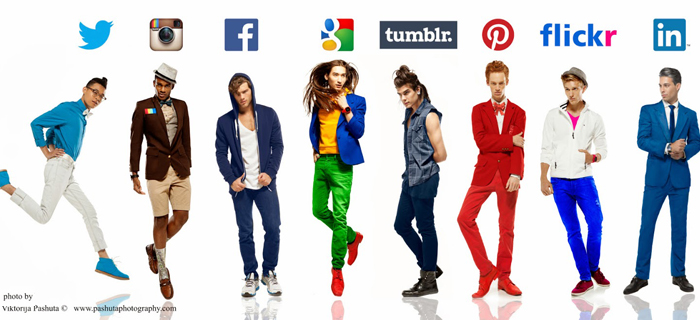Kinderen en jongeren zijn continu in het nieuws. De meest lezenswaardige/opvallende berichten uit andere bronnen verzamel ik wekelijks in een post met ‘kortjes’ – oneliners met een linkje naar het oorspronkelijke artikel. KLIK & LEES:
Fashion photographer Viktorija Pashuta asks the question: what if guys were social networks? — Her latest series sees models dressed in the colors and fashion you might associate with each network (Visual News)
Disney’s Frozen has toppled Barbie as the No. 1 toy parents plan to buy for their little girls this holiday season, the first time in 11 years that Barbie has not held the top spot; Lego toys are No. 1 for boys (Chicago Tribune)
Lego has done great ads with girls over the years and retakes that space with confidence in the 60-second spot below — a lovely meditation on moms and daughters and the independence that both inspires and is reinforced by imaginative play (Adweek)
[youtube http://www.youtube.com/watch?v=BfhV3Q4LJPM]Anyone hoping to survive winter the quintessentially Boston way may be without one key item this shopping season — L.L. Bean’s signature bean boots: “Younger people are buying them, (…) they’re back in style” (Boston.com)
A British video blogger has sold more than 78,000 copies of her first book in a week, beating established authors like JK Rowling and Dan Brown; Girl Online by Zoe Sugg, 24, set a record for sales of a debut novel in Britain (The Straits Times)
US book publisher Scholastic is sharing its findings on what kids want when it comes to books; notably, humorous books top the charts, with 70% of kids ages six to 17 saying they want books that “make me laugh” (Kidschreen)
The third installment of the Hunger Games film franchise is by far the most evocative of real-world inhumanity; you have to understand that the way adolescents process violent media is not in the way adults might worry they do (Wired)
KFC is targeting families this Christmas with seasonal advert The Boy Who Learnt to Share based on the ‘all-hands-in’ experience that comes from sharing KFC (The Drum)
[youtube http://www.youtube.com/watch?v=KtgPcYc81co]The slipping viewership among young audiences may be because children’s programming is particularly vulnerable to competition from streaming services like Netflix and Hulu: “A 5-year-old is probably less concerned with seeing the latest Spongebob Squarepants” (The Street)
YouTube — where only people ages 13 and older can create an account — is the number one website among kids ages 8 to 11, according to research from KidSay; 69% of U.S. tweens claim to have an account, despite YouTube’s restrictions against such activity (The Wall Street Journal)
Beginning next year Google plans to create specific versions of its most popular products for those 12 and younger; the most likely candidates are those that are already popular with a broad age group, such as search, YouTube and Chrome (USA Today)
Since launching their app, the creators of After School haven’t said a peep; their app, however, which allows high school students to post secrets and gossip anonymously to their classmates, has been anything but quiet (Re/code)
Code Blue is an app that acts as a simple panic button for teenagers when they need the help of a loved one (Springwise)
Teenage boys are perhaps more known for playing computer games but girls are better at making them, a study has found (ScienceDaily)
So many people are (still, incredibly) watching PSY’s Gangnam Style on YouTube that the global novelty smash has broken the view counter (Fact)
Awareness and conversations about sexism, respect, and equality seem to be growing nonstop among Millennials of all genders; over one third of MTV audience members said they were thinking about feminism more than they used to (MTV Insights)
When listening to Moms’ criticism, and for a period afterwards, the teens’ brains show reduced activity in regions involved in emotional control and in taking other people’s point of view: “Youth shut down social processing and possibly do not think about their parents’ mental states” (Wired)
Parents may matter a lot more than schools for getting kids into science (NYMag.com)
Vooral jongeren voelen zich radeloos als zij onderweg niet kunnen beschikken over internet; de helft van 18-24 jarigen voelt zich volledig verloren als ze niet online kunnen gaan (AutomatiseringGids)
Uit onderzoek blijkt dat ouderen veel zuiniger op hun smartphone zijn dan jongere gebruikers; ruim 60% van de jongeren tussen de zestien en twintig jaar heeft wel eens schade aan zijn of haar smartphone gehad (Managersonline.nl)
Het is een hype waaraan ook bekende Nederlanders meedoen; met de app Dubsmash maak je video’s waarin je zelf bekende liedjes of filmscènes playbackt — grappig, vinden ook deskundigen, maar het zal ook wel snel weer over zijn (Tubantia)
Zenderbaas Suzanne Kunzeler van NPO 3 wil haar tv-station nog meer neerzetten als jongerenzender: “Nu is NPO 3 nog voor ‘jong denkende mensen’, dat wordt vanaf komend jaar louter 20 tot 34 jaar” (Mediacourant)
Het Nationaal Ouderenfonds en DierenPark Amersfoort hebben de handen ineengeslagen met een 65pluskind-abonnement: “Kinderen en dieren bieden vaak een fijne manier om in contact te komen met anderen” (Pretwerk)
Speelgoedwinkels beleven deze maand met Nederlands grootste kinderfeest en Kerst gouden tijden, maar kunnen fysieke spelers ook buiten de november- en decembermaand het hoofd boven water houden? “Speelgoed blijf in de kern altijd speelgoed” (RetailWatching.nl)
In de laatste aflevering van het populaire Sinterklaasjournaal was een Zwarte Piet te zien die volkomen gelijkwaardig was aan de Sint, met een mijter op en een tabberd aan (NU.nl)
De commotie rond het uiterlijk van Zwarte Piet verpest voor veel jongeren het Sinterklaasfeest; 95% geeft aan de discussie over Zwarte Piet ‘zat’ te zijn (EenVandaag Jongerenpanel)
Jumbo-ondernemer Marcel van Daalhuizen neemt met zijn Jumbo-medewerkers en zanger Dean Saunders een videoclip op voor een kerstsingle met een zwarte kerstman een hoofdrol, waarmee ze op ludieke wijze de draak steken met de Zwarte Pieten-discussie in Nederland (Distrifood)
Met alle aandacht die we tegenwoordig hebben voor cyberpesten en het mediawijs maken van kinderen en jongeren online, vraagt RTL Late Night aan juist deze groep om hun e-mailadres online te zetten (Marketingfacts)
Voor het eerst hebben Amerikaanse scholen voor hun leerlingen meer Chromebooks dan iPads gekocht (NU.nl)
Basisscholen mogen privégegevens van leerlingen doorspelen aan makers van digitaal lesmateriaal; staatssecretaris Dekker schrijft aan de Tweede Kamer dat dat niet in strijd is met de privacywetgeving (NOS)
Reclame aan universiteiten draait niet enkel om het werven van nieuwe studenten — zo verantwoorden de KU Leuven en de UGent de budgetten die ze aan hun reclamecampagnes besteden (Veto)
Bureau Halt begint en campagne tegen alle overlast die jongeren kunnen veroorzaken rond de jaarwisseling; medewerkers gaan zo’n 1.000 basis- en middelbare scholen langs om met leerlingen te praten over de gevolgen die zulk gedrag kan hebben voor andere mensen (Omroep West)
Volgens een nieuw onderzoek is er geen bewijs dat jongeren slechter gaan presteren door alcoholgebruik; een langlopende studie laat zien dat drinkers niet slechter functioneren dan niet-drinkers als het gaat om geheugen, impulscontrole en concentratievermogen (de Volkskrant)
En tot slot, klik hier voor de presentaties van een seminar over kinderapps, georganiseerd door stichting Kennisnet en Cinekid (Kennisnet)

